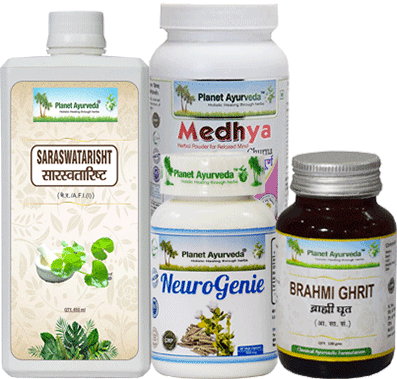Mixed Expressive-Receptive Disorders: Ayurvedic Treatment
Abstract
Communication is essential for expressing oneself and understanding others. It helps to ease human life. But hindrance to the normal functioning of mechanisms involved in these processes can disturb the personality and social skills of the individual. One category of such conditions is the mixed expressive-receptive disorders. So what are mixed expressive-receptive disorders? What are the features of this condition & how can one deal with it? What does ayurveda have to offer in such a scenario? Let us discuss answers to all these questions in detail through the following article.

Facts About Language Disorders
Before going into detail about the mixed expressive-receptive disorders, let us discuss some interesting facts regarding the language disorders. Here are a few interesting facts related to it.
- Approximately 15% of the children have hearing loss of varying degrees.
- Males are almost four times more prone to stuttering as compared to females.
- Language and speech disorders are quite common in children. Approx 5% of children around the age of six years face speech related difficulties.
- Children with speech and language disorders are more prone to bullying and hence special attention and care should be provided to such kids.
- A family history of communication disorders makes the next generation more prone to the condition.
Introduction
Mixed expressive-receptive disorders are seen in many children, the symptoms may take a while to appear. As soon as the child is born, various parameters define its growth from time to time. The child shows developmental milestones in various fields such as physical, cognitive, social and emotional development, etc. The child learns to speak gradually. When the above mentioned developmental skills are not properly developed, it may result in various kinds of language disorders. The mixed expressive-receptive disorders are a type of communication disorder, which is characterized by the hindrance of both receptive and expressive areas of communication. The hindrance in the developmental growth can be receptive, expressive or mixed.
- Receptive language disorder – This condition hinders the ability of the person to receive the language. The child faces trouble in following instructions and often tunes out.
- Expressive language disorder – In this condition, the child faces difficulty in expressing himself.
- Mixed receptive – expressive language disorder – This condition is a combination of both the above described conditions. The child faces difficulty both in receiving as well as expressing. In simpler words, he/she faces difficulty in both understanding the messages and expressing himself. There can be various causes which will be described as follows.
Causes Of Mixed Expressive Receptive Disorders
There can be a variety of causes underlying the condition of mixed expressive-receptive disorders. This condition is not always related directly to the intelligence of the child. The mixed expressive-receptive disorders can also be acquired, it can be a result of neurological injury. Few of the leading causes of these types of disorders can be seizures, stroke, or other traumatic head injuries, etc. Let us learn about the symptoms of this condition.
Symptoms Of Mixed Expressive Receptive Disorders
The symptoms will also vary in each case of mixed expressive-receptive disorders, let us discuss the most common ones –
- The child faces learning difficulties. It is very comprehensible, because the child is facing difficulties in understanding the instructions and expressing himself. This will hinder his skills to learn new things.
- The child is seen to face difficulty in following the given instructions because he is unable to understand the language or command.
- The child faces various other difficulties also, he feels it difficult to properly summarize and express his thoughts.
- Due to all these difficulties, the child feels difficulty in various social settings, He/she may have a feeling of inferiority and be left out as he/she is unable to cope with their classmates or friend circle.
- The child will also face difficulty in forming sentences and proper communication.
So, these symptoms will help to diagnose the condition, let us discuss more about the diagnosis of mixed expressive-receptive disorders through the following article.
Diagnosis Of Mixed Expressive Receptive Disorders
The first point of diagnosing the mixed expressive-receptive disorders is when should the parents or family get concerned about the child’s development and communication skills? There are few guidelines that are considered as indicators of mixed expressive-receptive disorders, which are as follows –
- If he/she does not use a single word by 15 month
- If he/she does not use a double word by 24 month
- Does not follows instruction
- The child faces difficulty in interacting with other children.
These features along with above described symptoms when observed in a child must be considered as a sign to go for further treatment.
Treatment Of Mixed Expressive Receptive Disorders
The management of mixed expressive-receptive disorders will include the involvement of parents, teachers, therapists, etc. The first step would be educating the parents regarding the condition so they can understand their child’s condition and support him/her in a better way. Language therapy is given to the child to cope with the condition in a better way. Depending on the cause and symptoms, the medicinal interventions may be applied. Let us now discuss this condition’s ayurvedic aspect.
Ayurvedic Aspect Of Mixed Expressive Receptive Disorders
Ayurveda is an age old science with enormous medicinal gems. Even owing its origin to so many years back, it has not lost its relevance even a bit. This is a result of the vast medicinal theories, facts and remedies described in the ayurvedic literature. Ayurveda presents a very unique explanation regarding each health topic.
The condition of mixed expressive-receptive disorders can be correlated with the vitiation of udana vayu. The Ayurvedic acharya Sushruta considers the vitiation of vata, pitta, kapha as the cause of all the diseases in the body. The disease is caused by vitiation of all the three dosha but marked by the dominance of the more aggravated one. The general features of vata are the ability of movement, cold property, light in nature, regulates neurological processes, etc. The vitiation of the vata dosha will present hindrance in these features in the body.
So in this case, there will be dushti or vitiation of vata with the dushti of manovaha srotas leading to the disturbance in the indriya (senses). These vitiated components will deprive the indriya (sensory organs) from its ability to function properly. Hence, leading to difficulties in understanding and expressing oneself. The ayurvedic line of management will deal with improving the neurological strength of the body along with balancing the vitiated levels of vata dosha. This goal can be achieved by modulating the diet and lifestyle along with the administration of herbal ayurvedic supplements which will be detailed as follows.
Herbal Remedies By Planet Ayurveda For Mixed Expressive Receptive Disorders
Planet Ayurveda is preparing medicinal formulations that contain natural herbs beneficial for the health of the body. All the herbal products manufactured here are free from chemicals, preservatives, starch, additives, colors and fillers. These products are hundred percent natural and are formulated by MD Ayurvedic doctors with deep knowledge of Ayurveda and many years of experience.
The herbal products suitable for managing the condition of mixed expressive-receptive disorders are described in detail as follows –
- Medhya Churna
- Neurogenie cap
- Brahmi Ghrit
- Saraswatarisht
Product Description
1. Medhya Churna
Medhya churna consists of eleven wonderful herbs such as Vacha (Acorus calamus), Ashwagandha (Withania somnifera), etc. which work on every part of the body. These herbs are used for vata-anulomana, and kapha, pitta nihsaraka and directly act on the brain. This herbal product has proven its efficacy since ancient times and is effectively helpful in improving memory power, increasing the retaining capacity with high recognition properties. Hence, it helps to manage the condition of the mixed expressive-receptive disorders effectively.
Dosage -1/4th tsp two times a day with warm milk or ghee, after meals.
2. Neurogenie capsules
Neurogenie capsules are formulated by ayurvedic experts in planet ayurveda. It contains two wonderful ayurvedic herbs namely brahmi (Bacopa monnieri) and ashwagandha (Withania somnifera). These two herbs are known to be very effective and beneficial for the nervous system. They help to pacify the excessive vata dosha and also provide strength to the nerves and the brain. This will help to cope with the mixed expressive-receptive disorders.
Dosage – Neurogenie capsules can be given 1capsule two times a day, after meals.
3. Brahmi Ghrit
Brahmi ghrit contains various herbal components such as brahmi (Bacopa monnieri), vacha (Acorus calamus), etc. prepared in go ghrit (cow ghee). Brahmi ghrit is very beneficial for improving the neurological state of the body. It helps to improve various conditions such as apsmara, unmada, etc. It is known to improve the concentration levels and memory of the individual. Brahmi ghrit helps to improve the condition of mixed expressive-receptive disorders up to a great extent.
Dosage -1/2 tsp two times a day with warm water after meals.
4. Saraswatarisht
Saraswatarisht is being prepared by planet ayurveda. It contains plenty of natural ayurvedic components such as brahmi (Bacopa monnieri), shatavari (Asparagus racemosus), adrak (Zinziber officinale), etc. This combination of ayurvedic components help to pacify the excessive vata dosha from the body and hence, improves neurological health. Saraswatarisht shows great results in managing various personality disorders also and can manage the condition of mixed expressive-receptive disorders efficiently.
Dosage – One teaspoons two times a day, after meals.
Contact Planet Ayurveda Support Team to provide you the costing / ordering and delivery information at – costing.planetayurveda@gmail.com or Call at 0172-521-4030 (India), +91-172-521-4030 (Outside India) or Whatsapp at (+91) 9915-593-604.
Conclusion
So, in a nutshell, all the above described information can be compiled and it can be concluded that the condition of mixed expressive-receptive disorders can be managed effectively with the appropriate use of ayurvedic formulations. The ayurvedic principles believe to rectify the disease right from its roots rather than just managing the symptoms. So, by restricting the causative or aggravating factors and following a healthy diet along with the administration of ayurvedic formulations (as described above), the condition of mixed expressive-receptive disorders can be managed effectively through ayurveda.







